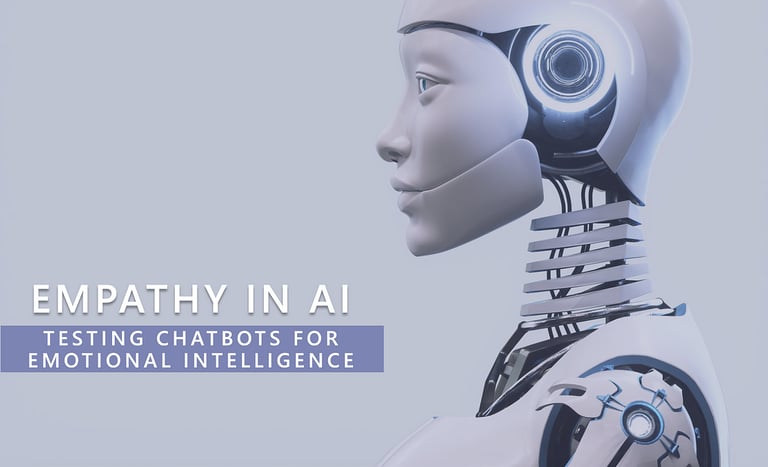Emotionally Intelligent Chatbots: Redefining Customer Service with Empathy
In 2025, emotionally intelligent chatbots are revolutionizing customer service by combining AI with empathy. These advanced bots can recognize tone, detect emotional cues, and respond in a human-like manner—creating more meaningful, trust-driven interactions. In this blog, we explore how AI-powered empathy is reshaping customer experiences, the psychology behind it, real-world applications, and what it means for the future of digital marketing.
7/12/20255 min read


The significance of empathy within communications cannot be understated. Empathy allows individuals to connect on a personal level, understand diverse perspectives, and respond to emotional cues effectively. By embedding emotional intelligence into chatbots, companies can facilitate more human-like interactions that resonate with customers on an emotional level. This ensures that users feel heard and valued, leading to a more enhanced overall experience while interacting with automated systems.
Recent technological advancements have significantly improved the ability of chatbots to interpret and respond to human emotions. Using natural language processing (NLP), chatbots can analyze text input for emotional cues, from tone and sentiment to keywords that indicate user feelings. Machine learning algorithms further enhance this capability by allowing chatbots to learn from past interactions and adapt their responses accordingly. This data-driven approach enables these intelligent systems to refine their emotional understanding and improve response accuracy over time.
As AI continues to evolve, the focus on emotional intelligence is expected to deepen, addressing the nuances required for empathetic communication. By embracing the principles of emotional intelligence, organizations can leverage chatbots to redefine customer service, transforming them from mere transactional assistants into empathetic companions capable of fostering genuine customer connections.
The Evolution of Chatbots: From Rule-Based to Emotionally Intelligent
Chatbot technology has significantly evolved since its inception in the 1960s. Initially, chatbots operated on a simple rule-based framework, where their responses were predetermined and constrained by a finite set of rules. This early generation of chatbots, such as ELIZA and ALICE, could respond to specific keywords or phrases but lacked the capacity to understand context or manage complex conversations. Their interactions often felt mechanical, leading to a limited customer experience that could frustrate users.
As technology advanced, so did the capabilities of chatbots. The introduction of machine learning and natural language processing fundamentally transformed these virtual assistants. Unlike rule-based systems, these modern chatbots are designed to learn from interactions, allowing them to generate responses that are not only contextually appropriate but also reflective of the user’s emotional state. This switch from rigid programming to adaptive learning has marked the beginning of emotionally intelligent chatbots.
One significant milestone in this evolution was the development of platforms like IBM Watson and Google Dialogflow, which utilize deep learning and sentiment analysis. By incorporating advanced computational techniques, these chatbots are capable of discerning emotional cues in customer messages, enabling them to respond with empathy. For instance, a customer expressing frustration may receive a more empathetic and understanding reply, while a satisfied customer may be greeted with enthusiasm. This capability enhances the overall customer service experience, creating a more human-like interaction that can lead to higher customer satisfaction and loyalty.
The transition towards emotion-aware chatbots illustrates how advancements in AI have allowed businesses to improve customer relationships. As companies strive to differentiate themselves in a competitive landscape, emotionally intelligent chatbots are becoming indispensable tools, bridging the gap between automated solutions and genuine human interaction.
Practical Applications of Emotionally Intelligent Chatbots
The integration of emotionally intelligent chatbots has significantly transformed customer service across various industries. These advanced conversational agents leverage natural language processing and machine learning to understand and respond to customer emotions more effectively. As businesses strive to enhance customer experience, emotionally intelligent chatbots are increasingly being utilized for handling complaints, delivering personalized responses, and ultimately improving customer satisfaction.
One prominent application of these chatbots can be seen in the telecommunications industry, where they assist customers with billing issues and service outages. By analyzing the tone and context of a customer’s message, emotionally intelligent chatbots can identify frustration and tailor their responses accordingly. For example, a case study from a leading telecom provider revealed that after implementing such a chatbot, the resolution rate of customer complaints improved by 30%. This not only reduced the volume of calls to human representatives but also uplifted overall customer satisfaction scores.
In retail, chatbots are employed to enhance the shopping experience by offering personalized product recommendations based on previous interactions. This approach allows retailers to create a more engaging atmosphere, where customers feel understood and valued. Research indicates that 70% of consumers prefer personalized interactions, which can lead to increased sales. An e-commerce site reported a 20% uptick in sales following the deployment of an emotionally intelligent chatbot designed to provide tailored suggestions based on user preferences.
Moreover, emotionally intelligent chatbots are making their mark in the hospitality industry, where they manage guest inquiries and feedback. For instance, hotels that have adopted these systems can ensure prompt and empathetic responses, addressing guest complaints swiftly and effectively. This has fostered a sense of trust and connection between businesses and their clients, with some hotels experiencing a 25% increase in positive reviews following implementation. Clearly, the practical applications of emotionally intelligent chatbots are not only enhancing customer service but also setting new benchmarks for customer satisfaction across various sectors.
Future Trends: The Next Frontier in Customer Service AI
As customer expectations evolve, the role of emotionally intelligent chatbots is becoming increasingly significant within the realm of customer service. The application of machine learning technologies holds substantial promise for enhancing these bots' capacity to recognize and respond to human emotions more effectively. By leveraging advanced algorithms, emotionally intelligent chatbots can analyze not only text but also vocal tones and user behavior, leading to a more nuanced understanding of customer sentiments. This growing sophistication in emotional understanding is expected to lead to more personalized customer interactions, fostering deeper connections and higher levels of satisfaction.
Emerging technologies such as natural language processing (NLP) and sentiment analysis will play vital roles in the development of advanced emotionally intelligent chatbots. These tools enable bots to not only comprehend user inquiries better but also to discern the emotional context behind them. As AI continues to improve its ability to interact empathetically, customer perceptions of such technologies are likely to shift, with growing acceptance of AI as viable partners in resolving customer issues. The expectation is for these bots to handle complex queries with empathy, reflecting human-like understanding, which could fundamentally redefine customer service paradigms.
However, the rise of empathetic bots is not without its challenges. Ethical considerations must be taken into account, particularly in sensitive interactions where emotional nuances are critical. Ensuring that these AI systems do not manipulate or exploit user emotions is paramount. Furthermore, maintaining human oversight in these scenarios cannot be understated. Customers should always have the option to communicate with human agents when necessary, ensuring that sensitive conversations are managed appropriately. This dynamic balance between empathy-infused automation and human intervention will be crucial in shaping the future of customer service AI.
Understanding Emotional Intelligence in AI
Emotional intelligence (EI) in the context of artificial intelligence refers to the capability of machines, particularly chatbots, to recognize, understand, and appropriately respond to human emotions. This blend of emotional awareness and cognitive processing is essential for creating interactions that feel more natural and engaging. In traditional customer service settings, empathy has always played a pivotal role in fostering positive interactions; similarly, integrating emotional intelligence into AI technologies aims to replicate this human quality to a certain extent.
Expert digital marketing solutions for your business.
Reach Out To Us
📞+91-7060648052
📞+91-8410130096
© 2024. All rights reserved.
Quick Links
Find Us On Social Media


Get To Know More About Us
